高级英语五,六册课文分析讲解
- 格式:doc
- 大小:380.50 KB
- 文档页数:76

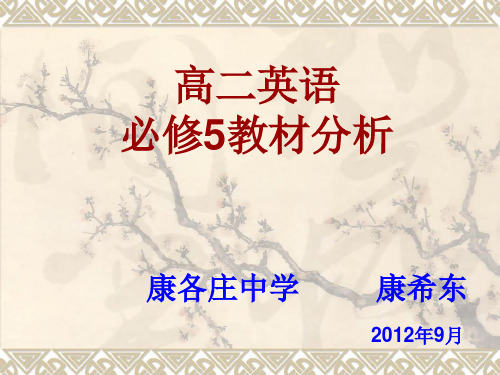
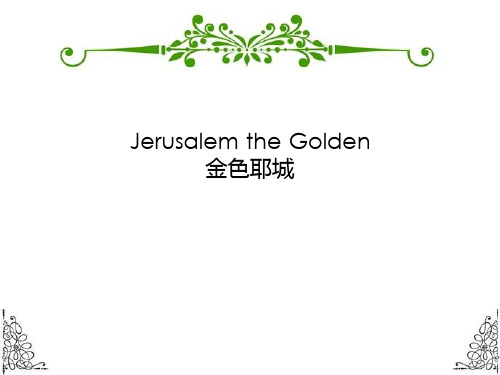
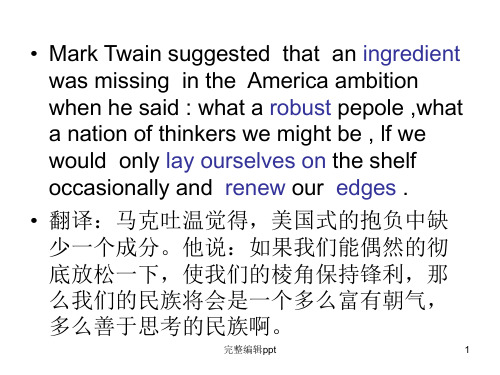
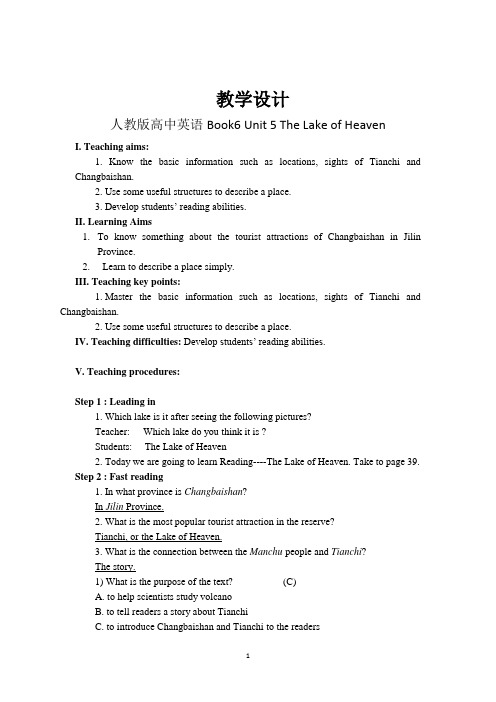
教学设计人教版高中英语Book6 Unit 5 The Lake of HeavenI. Teaching aims:1. Know the basic information such as locations, sights of Tianchi andChangbaishan.2. Use some useful structures to describe a place.3. Develop students’ reading abilities.II. Learning Aims1.To know something about the tourist attractions of Changbaishan in JilinProvince.2.Learn to describe a place simply.III. Teaching key points:1. Master the basic information such as locations, sights of Tianchi and Changbaishan.2. Use some useful structures to describe a place.IV. Teaching difficulties:Develop students’ reading abilities.V. Teaching procedures:Step 1 : Leading in1. Which lake is it after seeing the following pictures?Teacher:Which lake do you think it is ?Students:The Lake of Heaven2. Today we are going to learn Reading----The Lake of Heaven. Take to page 39.Step 2 : Fast reading1. In what province is Changbaishan?In Jilin Province.2. What is the most popular tourist attraction in the reserve?Tianchi, or the Lake of Heaven.3. What is the connection between the Manchu people and Tianchi?The story.1) What is the purpose of the text? (C)A. to help scientists study volcanoB. to tell readers a story about TianchiC. to introduce Changbaishan and Tianchi to the readers•Location:•be/lies/stands in•be located/situated in•on top of/ at the bottom ofSpecial features (Appearance/size/ height/depth/history/story):•…is covered with…. …is home to…•…is rich in…. is famous/well-known for…meters high/long/wide/deep/above sea level•the height varies from..to•…covers an area of ….•There are many stories told about ….The most well –known concerns•adjs: largest/longest/greatest/unique spectacular/grand/amazing…What to see or do:•When you arrive, you are rewarded not only with … but also by…•If you are lucky enough to visit …,don’t forget to …•enjoy/see/watch/observe/walk/study/Step 6 AssessmentWritingPlease appreciate these pictures on the screen and write a short passage to introduce Fusheng park.Step 7: Homework1. Surf the Internet to find more information about the Lake of Heaven.2. Preview Exercise 2 on page 40.学情分析——人教版高中英语Book6Unit 5 The Lake of Heaven该班学生英语水平整体基础比较差,基于学生的基础知识和基本技能的掌握情况,为了培养学生学习英语的兴趣,设计方面要结合学生特点,简单易懂。
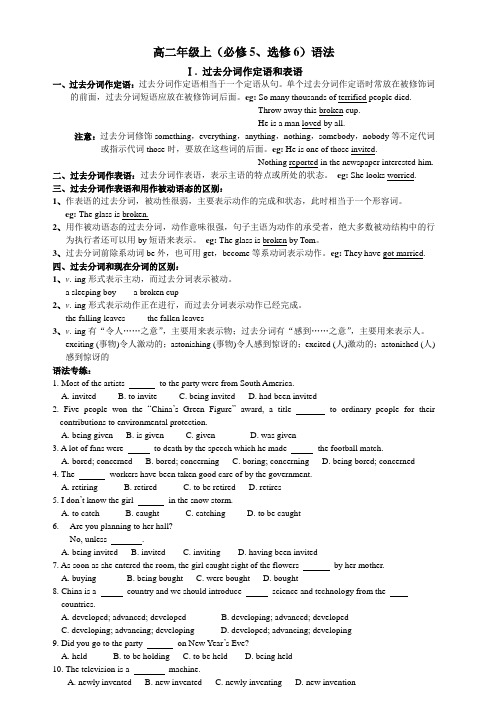
高二年级上(必修5、选修6)语法Ⅰ. 过去分词作定语和表语一、过去分词作定语:过去分词作定语相当于一个定语从句。
单个过去分词作定语时常放在被修饰词的前面,过去分词短语应放在被修饰词后面。
eg: So many thousands of terrified people died.Throw away this broken cup.He is a man loved by all.注意:过去分词修饰something,everything,anything,nothing,somebody,nobody等不定代词或指示代词those时,要放在这些词的后面。
eg: He is one of those invited.Nothing reported in the newspaper interested him.二、过去分词作表语:过去分词作表语,表示主语的特点或所处的状态。
eg: She looks worried.三、过去分词作表语和用作被动语态的区别:1、作表语的过去分词,被动性很弱,主要表示动作的完成和状态,此时相当于一个形容词。
eg: The glass is broken.2、用作被动语态的过去分词,动作意味很强,句子主语为动作的承受者,绝大多数被动结构中的行为执行者还可以用by短语来表示。
eg: The glass is broken by Tom。
3、过去分词前除系动词be外,也可用get,become等系动词表示动作。
eg: They have got married.四、过去分词和现在分词的区别:1、v.-ing形式表示主动,而过去分词表示被动。
a sleeping boy a broken cup2、v.-ing形式表示动作正在进行,而过去分词表示动作已经完成。
the falling leaves the fallen leaves3、v.-ing有“令人……之意”,主要用来表示物;过去分词有“感到……之意”,主要用来表示人。
高二英语教材Unit5-6知识点总结及重难点解析【考点】与consist 有关的短语①consist of 由……组成(= be made up of)②consist in 在于[例句] The club consists of more than 200 members. 俱乐部南200多个成员组成。
The beauty oF the village consists in its clean air and peaceful environment. 这个村庄的美丽之处在于它清洁的空气和幽静的环境。
【考例】The opening province which ____ thirteen counties and three coastal cities will quicken its paces of economic development. A. consists of B. makes upC. is included D. is contained [考查目标] 此题主要考查相似意义的短语或动词的用法辨义问题。
[答案与解析]A B应该使用被动结构.即:is made up of。
C不应该使用被动语态。
而D本身是错误的,在本题中不可使用。
10. Deal with aman as he deals with you. 以其人之道还治其人之身。
deal with 处理,对付How can I deal with the problem? 我应该如何处理这个问题?(相当于:What can I do with the problem?) We have dealt with the finn for many years.我们和这家公司有多年生意来往。
deal with 也可译作“与……有生意来往”。
【考点】clear up 和clean up①clear up 整理;消除;澄清;放晴②clean up 彻底打扫;清理干净[例句] Would you clean up this room before our visitors arrive?客人到来之前,你打扫房间好吗?She would like to have a talk with her classmate to clear up their misunderstanding. 他想和同学交谈以解除他们之间的误会。
大学高级英语教材全解IntroductionThe study of advanced English in university is an essential step for students to enhance their language skills and deepen their understanding of English literature, culture, and society. In this article, we will delve into the comprehensive analysis and interpretation of a popular advanced English textbook used in universities.Chapter 1: Reading SkillsIn this chapter, the textbook focuses on developing effective reading skills for advanced English learners. It introduces various strategies, such as skimming and scanning, close reading, and critical analysis, to improve comprehension and interpretation of complex texts. Additionally, it provides exercises and sample texts to practice and reinforce these skills.Chapter 2: Listening and Speaking SkillsThis chapter is dedicated to honing advanced listening and speaking skills. It covers various aspects, including note-taking techniques, listening for main ideas and specific information, as well as strategies for effective public speaking and discussions. Practical exercises and audio recordings help students develop proficiency in these areas.Chapter 3: Grammar and VocabularyUnderstanding and applying advanced grammar and vocabulary is crucial for English proficiency. This chapter delves into complex grammatical structures, idiomatic expressions, and nuanced vocabularyusage. Through clear explanations, examples, and exercises, students are equipped with the necessary tools to enhance their linguistic accuracy and fluency.Chapter 4: Writing SkillsWriting at an advanced level demands mastery of different genres and writing styles. This chapter provides guidance on formal and informal writing, including academic essays, argumentative pieces, and creative writing. It emphasizes critical thinking, organization, and coherence in writing, while also highlighting grammar and vocabulary usage. Students can practice their skills through writing assignments and receive constructive feedback.Chapter 5: Literature and CultureEngaging with literature and culture is an integral part of advanced English studies. This chapter introduces significant literary works, including novels, poems, and plays, from various periods and cultures. It highlights the analysis of themes, literary devices, and socio-cultural contexts. Students are encouraged to develop critical perspectives and interpretations through interactive discussions and written assignments.Chapter 6: Language and SocietyLanguage is deeply intertwined with society, and this chapter explores the relationship between language and various social aspects. It covers topics such as language variation, dialects, multilingualism, and language policy. Students gain insights into the impact of language on social identity, powerdynamics, and cultural diversity, enabling them to analyze and reflect on language use in real-world scenarios.ConclusionThis comprehensive analysis of a university-level advanced English textbook highlights its diverse content and its ability to enhance students' language proficiency and cultural understanding. The textbook not only equips students with essential language skills but also encourages critical thinking, cultural appreciation, and effective communication. By engaging with this textbook, students can deepen their understanding of the English language and its role in a globalized world.。
Module6 单元分析I. 教学内容分析本模块的话题是处境危险的动物,介绍了许多珍稀动物正濒临灭绝的严峻现实,并分析了珍稀动物濒临灭绝的主要原因。
同时展示了目前政府和志愿者们所采取的措施和做法,号召人们要保护环境。
通过本模块的学习,要培养学生保护动物和大自然的意识。
本模块复习了一些关于动物的词汇,要求学生学会描述正濒临灭绝珍稀动物,探讨一些拯救野生动物的办法和措施。
Introduction 通过介绍西伯利亚虎的现状,复习和学习一些与野生动物有关的词汇,简要列出珍稀动物濒临灭绝的原因。
Reading是一篇关于拯救藏羚羊的文章,文中介绍目前藏羚羊濒临灭绝的严峻现实以及我国政府及世界野生动物保护组织为拯救藏羚羊所做出的巨大贡献。
通过学习,培养学生保护动物、保护大自然的意识。
Grammar部分主要复习定语从句这一语法项目。
Vocabulary and Listening部分主要分为两部分。
第一部分通过阅读关于稀有动物的描述学习关于动物种类的单词——bird, insect, mammal and reptile和通过练习复习动物名称。
第二部分听力是关于南非Tamble 自然保护区的一名志愿者工作经历的介绍。
Function介绍一些表达“忧虑”和“担心”的功能用语。
Speaking探讨寻求一些拯救野生动物的办法和措施Everyday English通过学习V ocabulary and Listening中的句子学会一些非常有用的日常生活用语:keep an eye on, a terrible din, go for someone和It’s a pity。
Learning to learn是介绍时间状语的位置既可放句首又可放句末的现象,建议学生发现更多的例句,对于提高学习策略水平有很大的帮助。
Reading and Writing第一部分利用表格的形式对西伯利亚虎,蓝鲸,非洲象和秃鹳四种珍稀动物进行介绍;第二部分通过示范对西伯利亚虎的简介要求学生仿写另外一种动物的描述。
《高级英语》自学指导用书编者:赵晓Part One: College English Book FiveLesson 1 Rashid‟s School at OkhlaI. IntroductionRashid‟s School at Okhla, taken from Santha Rama Rau‟s first book Home to India, records the author‟s visit with her aunt Kitty to a village school a t Okhla in 1939, when she was a 16-year-old girl newly returned from ten-years‟ schooling in Britain to her native country India. The text gives us a glimpse of her intense interest in the changes that were taking place in her native land and of the educational campaign carried out by the Congress Party hoping to bring political consciousness through education to the people of India. In running the village school, Rashid, the headmaster, met with and conquered various difficulties: the villagers‟ deep-rooted suspicion about education, religious obstacles and financial shortage, etc. It was out of countless such efforts by numerous Indians that the New India was created.II. Organization of the Text1. On the way to Okhla (Paragraphs 1-2)Through description of the road condition, traffic and property of bullock and camel owners, the author brings out the poverty and backwardness of India and foretells the difficulties for the educational campaign carried on in the Indian villages.2. At Okhla (Paragraphs 3-4)Another picture is taken of the backwardness and isolation of the Indian village by specific description of the village huts, multi-functional tiny shop, and early marriage of the village women.3. Meeting Rashid at his school (Paragraphs 5-18)In describing the school activities, the author tells the reader the difficulties involved in running a village school (i.e. villages‟ deep-rooted suspicion about education and religious barriers) and great efforts and enthusiasm exerted by the Congress Party of which Rashid serves as one of its representatives in the educational campaign.4. Meeting Rashid at Kitty‟s home in Delhi (Paragraphs 19-24)Another difficulty is discussed in the conversation between Kitty and Rashid: lack of financial support from the colonial government. At the same time, the author‟s mother speaks of the relationship between reason and conscience and analyzes the difference in education between the Western countries and India.III. Key Words and Expressions1. orderly (Para 1): well-arranged.2. facilitate (Para 1): make…easy or easier.3. brass (Para 1): an alloy of copper and zinc. Compare: copper (a single element) and bronze (an alloy of copper and tin).4. household utensils (Para 1): 家庭用具。
Compare: household appliances(家用电器)。
5. proprietor (Para 3): (shop) owner.6. as much…as (Para 5): to the same degree…as, e.g. It is as much our responsibility as yours(这是你们的责任,同样是我们的责任).7. fluid English (Para 5): fluent English.8. enunciate (Para 6): pronounce.9. in a florid tone (Para 6): in a showy tone.10. an impetus (Para 6): a push forward.11. gauge (Para 6): judge; estimate.12. in a small way (Para 8): on a small scale. Compare: in a big way (= on a large scale).13. inaugurate (Para 8): start; launch.14. accomplish (Para 9): succeed in doing something; finish successfully. Compare: finish, complete and accomplish. To finish is to bring something to an end; to complete is to make something whole or perfect; and to accomplish implies great effort involved. E.g. I need one more stamp to complete my collection of this set (i.e. This set of stamps is made complete.). But: I finished my stamp collection at the age of 16 (i.e. I stopped collecting stamps then.).15. skeptical (Para 9): suspicious.16. carry weight (Para 10): have importance; have effect.17. substantial difference (Para 11): great difference.18. misrepresent the incident (Para 18): give an untrue account of the issue slightly.19. a rickety bus (Para 19): a shaky bus; a very old bus that is likely to fall to pieces.20. true to his promise (Para 19): in accordance with his promise; as he had promised to do.21. carry through (Para 20): carry out.22. not courage so much as hard work and money…(Para 21): not courage but rather hard work and money. Not…so much as or not so much…as: not…but rather(与其说是。
不如说是。
).23. might as well (Para 23): also may (just) as well: have no strong reason not to(不妨).24. contradict (Para 23): rebuke.25. on my hands (Para 24): as my pressing responsibility. Antonym: off my hands: not as my pressing responsibility.26. mutual corrective (Para 24): something that corrects each other‟s defects.IV. Questions for Discussion1. Was the Agra road an asphalt road or a dirt road? What gives the clue to your answer in the text?(It was a dirt road. The sentence “behind us the dust rolled upward in thick red clouds” gives the clue in the text.)2. What were the four functions of the shop owner at Okhla?(The shop owner at Okhla serves as a provider of daily commodities, a governor of the village,a village banker and a village letter-writer.)3. What signs of educational activity among the children did the two visitors notice?(They noticed that the children were taught fine arts, farming and geography.)4. What difficulties did Rashid have in persuading the villagers to send their children to his school? How did he manage to do that?(Firstly, the villagers were suspicious about education. They didn‟t believe they could really learn something useful from the educational campaign. Secondly, they were concerned more about family finances than about their children‟s education, as the children became important to their families in that they could help support their families. Rashid managed to assure the villagers that the children would learn really useful things in school --- how to enrich the soil and how to make the land more productive. He also persuaded the villagers to send their children to school by offering to provide the means for the children to reel cotton for an hour every day so that theearnings from the cotton spools could be used to support their families.)5. Was the school co-educational? Was co-education common in cities then in India? What did Rashid say the reason was?(Yes, it was. No, it wasn‟t. Rashid said that, once the poor villagers moved to cities, they lost their land and consequently a kind of independence spirit. Therefore they were more affected by traditional customs and ideas which disapprove of co-education. As a result, co-education was less common in cities and in the countryside in India.)6. Rashid denied that it took courage to open the school. Why did he deny that? What did he say it took?(Because theoretically the colonial government supported education for all people and there were even some laws concerning this matter. Rashid said it took hard work and money.)7. The mother said that Rashid had a “frightening responsibility.” Why did she think it was frightening?(It was frightening because the children would never forget what was taught and so a teacher had no chance of making any mistakes. It was frightening also because sooner or later the new ideas taught would conflict with old ideas, beliefs and habits and so a teacher was doing something risky.)8. What does the mother say about reason and conscience?(Reason is the mental power of judging right or wrong from principles, religious codes, or conventional moral customs. Conscience is the individual sense of judgment of what is right or wrong. In the mother‟s view, we rely on both reason and conscience. They compensate each o ther by correcting each other‟s shortcoming.)9. What do you think Rashid had in mind when he said that education was only an impetus to the achievement of “political consciousness”?(When he said that education was only an impetus to the achievement of “political consciousness,” Rashid had two ideas in mind. One was that a teacher should treat the villagers as his equals and should not act in a way that would show his superiority to the villagers. The other was that a teacher could only push the villagers to educate themselves, but how much they achieved in education depended on themselves. A teacher could not take the place of the villagers in the educational campaign.)10. What do you think of Rashid as a person?(Rashid was a man of immense energy. He was passionate yet practical. He was well-educated and had a profound love for his students and his country. He was also timid.)V. ExercisesA. Fill in the blank in each sentence with the best word or expression from the box below, changing its form when necessary:facilitate as much…as impetus gauge in a small way not so much…as misrepresent inaugurate carry weight substantial true to on one‟s hands1. Such a port would __________ the passage of oil from the Middle East to Japan.2. She has a large family __________.3. His actions are always ________ his words.4. The mayor‟s opinion ______ great ______ in this town.5. The private wanted to show the sergeant that he was ______ a man ______ anybody.6. Foreign investments have become the primary ________ behind the country‟s economic recovery.7. The demonstrators demanded that blacks be given a __________ voice in the government.8. The elections were over and the first native Governor was ________.9. It was ______ the clothes ______ the man himself who impressed immediately.10. Witnesses claim to have been seriously ________.(Key: 1. facilitate 2. on her hands 3. true to 4. carried…weight 5. as much…as6. impetus7. substantial8. inaugurated9. not so m uch…as 10. misrepresented)B. Choose the right word from the box given below for each blank:introducing conflict technology known status resulted significant destroyed seeds power worse that led methods countries supplies development declined growth rate turn number shown system swiftly that1. The “Green Revolution”The introduction of new varieties of rice and wheat in Asia and Latin America has been (1)______ as the “Green Revolution.” So far t he new (2)______ and the accompanying technology have not (3)______ in increased agricultural production per head or reduced malnutrition. The direct, quantitative effects of (4)______ high-yielding variation of food grains have been modest.The indirect and quantitative effects, however, have sometimes been (5)______. The new technology has (6)______ to changes in crop pattern and in (7)______ of production. It has accelerated the (8)______ of a market-orientated, capitalist agriculture. It has encouraged the (9)______ of wage labor, and thereby helped to create or augment a class of agricultural laborers. It has increased the (10)______ of landowners, and this in (11)______ has been associated with a greater polarization of classes and intensified (12)______.Changes in (13)______ and class alignments have been accompanied by changes in the distribution of income. Profits and rents have increased absolutely and relatively. The share of wages has (14)______ and in some instances real wages rates or the (15)______ of days worked, or both, have declined. In short, an old (16)______ of agriculture, slowly or (17)______ is in the process of being (18)______ by the advance of contemporary (19)______.The policies (20)______ have accompanied the “Green Revolution” in many underdeveloped (21)______ have aggravated the problems (22)______ these countries face. (23)______ of some commodities have increased, but the (24)______ of growth of total agricultural production has (25)______ little tendency to rise. At the same time, inequality has become (26)______, poverty has increased absolutely.(Key: 1. known 2. seeds 3. resulted 4. introducing 5. significant 6. led 7. methods 8. development 9. growth 10. power 11. turn 12. conflict 13. status 14. declined 15. number 16. system 17. swiftly 18. destroyed 19. technology 20. that 21. countries 22. that 23. supplies 24. rate 25. shown 26. worse)Lesson 2 Four Choices for Young PeopleI. IntroductionIn the 1960s, American youth were disillusioned with what they called “the adult world” forits social problems like racial discrimination, poverty and the Vietnam War and rebelled against it in various ways. They rejected the conventional social values and voiced their beliefs and attitudes to protest against the American society in which they had no further confidence: some quit the usual ways of society; some escaped from cities to the unspoiled country to live a rather primitive communal life; and still others took up arms, hoping to get rid of the social evils once and for all. Against this background, the author wrote this article to suggest that reform approach was the only workable way for young Americans to deal with the social problems.II. Organization of the Text1. American youth‟s dissatisfaction with the American society (Paragraphs 1-2)2. Four choices for them to deal with the social problems (Paragraphs 3-14)①Author’s attitude toward the youth’s dissatisfaction (Paragraph 3)②The first choice: drop out (Paragraph 4)③The second choice: flee (Paragraphs 5-6)④The third choice: plot a revolution (Paragraphs 7-10)⑤The fourth choice: reform (Paragraphs 11-14)III. Key Words and Expressions1. misgivings (Para 1): anxiety; worries.2. scores of (Para 2): a large number of.3. do without (Para 2): dispense with; manage without.4. cope with (Para 3): deal successfully with.5. drop out: quit the usual ways of society, such as rejecting conventional social values and withdrawing from conventional social activities.6. expedient (Para 4): temporary solution.7. batten on (Para 4): live well on.8. run out of (Para 6): have no more of.9. unsullied (Para 6): unspoiled.10. bucolic (Para 6): pastoral.‟11. workings (Para 7): mechanisms.12. dashing (Para 7): energetic.13. charismatic figure (Para 7): one who has great popular appeal.14. revolutionist (Para 8): a professional revolutionary or a revolutionary with serious intention.15. come off (Para 8): happen.16. senescence (Para 8): old age.17. disillusionment (Para 8): disappointment.18. hard-faced (Para 8): stubborn.19. stuffy (Para 8): dull; without imagination.20. dawn on (Para 9): bring about.21. bureaucracies (Para 9): government organizations at all levels.22. inviting (Para 11): attractive.23. exasperating (Para 11): annoying.24. in short supply (Para 11): scarce. Compare: in full supply.25. remedy (Para 11): put or make right.26. in a mess (Para 12): in trouble.27. vehemently (Para 12): strongly; violently.28. affluent (Para 13): wealthy; rich.29. dawn on (Para 13): make…realize.30. insoluble (Para 13): unconquerable; unsolvable.31. warfare (Para 13): military war.32. insuperable (Para 14): unconquerable; unsolvable.33. pragmatically (Para 14): practically.34. dogged (Para 14): unyielding.IV. Questions for Discussion1. How do young Americans look at their society in general?(They look at the American society with great distrust and hold that American government should be responsible for all the social problems.)2. What does the author say is the most important decision for them to make?(The author thinks the most important decision for them to make is to choose a strategy to cope with the imperfect American society.)3. Why does the author say the first choice is “parasitic”?(Because those people who make the first choice depend on the society to make a living and yet refuse to take up any social responsibilities.)4. In what way does the second choice differ from the first one? Why does the author say it is no longer practical on a large scale?(The second choice differs from the first one in that the escapists are willing to support themselves and to contribute somethi ng to the society. They simply don‟t like the environment of civilization, that is, the city. It is no longer practical on a large scale because on the one hand, except for the polar regions, very few areas on the earth remain unsettled, and, on the other hand, except for the rich gentleman farmers, people are moving to the cities.)5. What people make the third choice? Why does the author say they “are bound to be disappointed in either case”?(People who make the third choice are those who have no patience with the tedious workings of the democratic process or who believe that basic institutions can only be changed by force. They are bound to be disappointed in either case because the author thinks if their revolution fails, the revolutionaries will either be killed or spend their remaining life in prison and even if their revolution is successful, the revolutionaries will still be disappointed as the new revolutionary state is just as hard-faced and stuffy as the old one. It is powerless in solving the old social problems.)6. What is the implied meaning of his analogy of a military campaign in the Apennines?(The implied meaning of his analogy of a military campaign in the Apennines is that social problems can not be solved once and for all. When the old problems are solved, new ones will come into existence. These new problems have to be dealt once again.)7. What is the fourth choice? What does the author think of it?(The fourth choice is the reform approach. The author thinks it is the only approach that works.) V. ExercisesA. Fill in the blank in each sentence with the best word or expression from the box below, changing its form when necessary:strike run out of cleanse disappoint insoluble unprecedented satisfy virtual contribute available symbolize vehement1. For many Americans, it is their lifelong dream to buy a ____________ two-storied house witha garden.2. To make Beijing our worthy capital, we must get it ____________ of polluted air, among other things.3. In a lot of cultures, red roses are used to ____________ love.4. Unfortunately, their car ____________ fuel, just ten miles short of Chicago.5. An ____________ event in history took place in 1969, when two American astronauts landed for the first time on the Moon..6. The detective finally gave up, declaring the mystery ____________ .7. Though high-sounding, his speech ____________ everyone at the meeting as totally irrelevant to what was discussed.8. If you travel by plane, Beijing and Guangzhou are ____________ neighboring cities.(Key: 1. satisfactory 2. cleansed 3. symbolize 4. ran out of 5. unprecedented 6. insoluble 7. struck 8. virtually)B. Circle the right word or expression in the brackets in each of the following sentences:1. The professor looked over our papers with a hasty (sight, glance) .2. Before ordering their dinner, they considered the (relevant, relative) merits of chicken and roast beef..3. The little boy‟s constant nois e (exhilarated, exasperated) his father, who was busy writinga paper for a symposium.4. Isn‟t it (wholesome, noisome) to live in a city with so many vehicles passing day and night?5. He was born in a small town (lived, inhabited) by about 500 people.6. Her desk was all (jumbled, cluttered) with old papers, strings, and other odds and ends.7. He thinks they are extremely (idealistic, ideal) , for all their pragmatism.8. She made one last (attraction, appeal) to her father for permission to go to the party.(Key: 1. glance 2. relative 3. exasperated 4. noisome 5. inhabited 6. cluttered7. idealistic 8. appeal)C. Choose the right word from the box given below for each blank:sick femininity politically touch correspondent felt relative settled frank friendship blonde cut eyes what invited heart arranged took wore submit widened across taken that glass restaurant dining member money face supplies covering fashion accepted said introduce least aside appointment distrusted2. Agnes SmedleyGetting in (1)_____ with Chou En-lai was a tougher nut to crack, since I (2)____ it essential that I meet him under auspices acceptable to him. So Bosshard (3)____ for me to meet Agnes Smedley at a luncheon in the YMCA (4)____ room. Though not a (5)____ of any Communist party, she had spent months in the cave city of Yen‟an and worshiped Chu Teh and his sturdy 8th Route Army.She was now a (6)____ for the Manchester Guardian --- when she (7)____ time off fromher aggressive assaults on the foreign community for (8)____ and hospital (9)____ to alleviate the neglect with which the Chinese treated their (10)____ and wounded soldiers.She was without much conventional charm of (11)____, her (12)____ was squarish, as was her figure. Her (13)____ hair, streaked in shades of sun-scorched yellow, was (14)____ in an indifferent bob; she (15)____ clothes for the sole purpose of (16)____ her body, with no thought of (17)_____.Though a (18)____ of the Marine Corps general Smedley Butler, she had little use for most military officers, except of course her beloved Chinese Reds. In her (19)____ the military were all (20)____ na?ve, an opinion she promptly stated in an abrupt and somewhat harsh voice.But after this initial phase of putting me in my place, she (21)____ down and we got along pleasantly enough. During coffee I (22)____ her to have Wiener schnitzel the next evening at the Austrian-Chinese (23)____. Though her eyes (24)____ momentarily with surprise, she (25)____. That evening, after the third gimlet, Agnes set her (26)____ down with a thump and(27)____ flatly: “What‟s this all about, Captain Dorn? I know damned well I‟m not the type(28)____ your type asks out on a date.”“I want you to (29)____ me to Chou En-lai and to ask him to be (30)____ with me.”“Well, at (31)____ you‟re honest about it. That‟s to your credit---(32)____ from all these drinks, I like honesty. Even though I think I‟m being (33)____ in. I‟ll see (34)____ I can do. I‟ve get an (35)____ with Chou tomorrow morning.”We finally shook hands (36)____ the table, and I began a long (37)____ with this intense, unhappy woman. A radical with a great soft (38)____, she refused to (39)____ to any form of discipline and (40)____ all political leaders.(Key: 1. touch 2. felt 3. arranged 4. dining 5. member 6. correspondent 7. took 8. money 9. supplies 10. sick 11. femininity 12. face 13. blonde 14. cut 15. wore 16. covering 17. fashion 18. relative 19. eyes 20. politically 21. settled 22. invited 23. restaurant 24. widened 25. accepted 26. glass 27. said 28. that 29. introduce 30. frank 31. least 32. aside 33. taken 34. what 35. appointment 36. across 37. friendship 38. heart 39. submit 40. distrusted)Lesson 3 Rock Superstars:What Do They Tell Us About Ourselves and Our Society?I. IntroductionRock music, shortening for rock and roll, started in the United States in the 1950s and quickly became popular throughout the world. Even today it is still popular with the teenagers. The author probes into the social significance of rock music from a sociological point of view. He begins with the scene of three rock concerts in the first three paragraphs to bring out the different attitudes held by teenagers and adults toward rock stars. Then by citing a sociologist and a musician, he points out that rock music is a sociological expression and that it mirrors its times. The rock music arena is a sort of debating forum where ideas clash and crash and where rock stars not only embody teenagers‟ attitudes toward soci al and political issues but also help the American society define its beliefs and feelings. The author returns to the question posed in the sub-heading, intending to encourage the readers to think seriously about the problem.II. Organization of the Text1. Description of the scene at three rock concerts (Paragraphs 1-3)2. Social significance of rock music (Paragraphs 4-10)①Authoritatives’views (Paragraphs 5-6)a. Music expresses its times. (Irving Horowits)b. Rock music is really a sociological expression rather than a musical force. (Todd Rundgren)②Examples to support their views (Paragraphs 7-10)a. Politics (Paragraphs 7-8)b. Feelings (Paragraph 9)c. Summary (Paragraph 10)3. Rewards to rock superstars: fame and gain (Paragraphs 11-12)4. Returning to the question raised in the title (Paragraph 13)III. Key Words and Expressions1. amphitheater (Para 1): “amphi-”, a prefix, meaning “circular, surrounding”; an amphitheater is a roofless building with rows of seats on a slope that completely surrounds and rises above a central usually circular area, especially one built in ancient Rome used for competitions and theatre performances圆形剧场2. packed (Para 1): crowded with people3. sprinkle (Para 1): spray4. contents (Para 1): the thing contained, here it refers to water5. surge (Para 1): move forward like a sea wave6. crunch up (Para 2): crowd up noisily7. singing ghoul (Para 2): horror singer8. marvelous (Para 2): wonderful9. tune up (Para 3): adjust a musical instrument and get ready for performance10. pilgrimage (Para 3): a religious journey made to show devotion to a sacred place11. adulation (Para 4): excessive praise12. reverence (Para 4): great respect13. fantasy (Para 4): imagination14. clash and crash (Para 5): three figures of speech are involved in this phrase: alliteration (repetition of an initial consonant in a series of content words头韵, e.g.: bread and butter), assonance (repetition of a stressed vowel in a series of content words 准押韵, e.g.: make, lake, late ,later) and metaphor (a comparison without the use of comparative words such as like or as 暗喻, e.g.: He is a lion.他勇猛得像头狮子[= He is as brave as a lion.]。